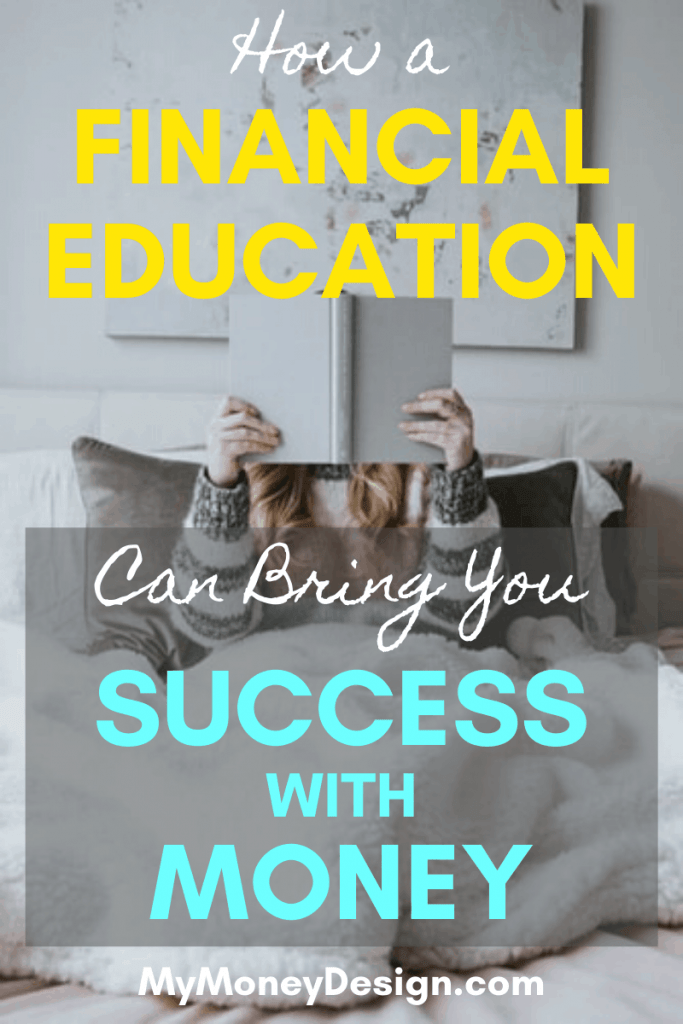Whenever someone asks “What should I be investing in?”, they’re usually looking for some kind of magic stock or once in a lifetime opportunity that will make them rich. But in reality, there is something far greater that everyone could invest in that will pay them back over and over again for the rest of their lives. It’s called their “financial education”.
A financial education is one of the single greatest assets a person can have. Yet, for too many, it often gets ignored or even neglected altogether.
Take, for example, the topic of saving for retirement. This is something we all know we must do. But according to this article from Money, less than 40% people surveyed can answer basic questions about their retirement plans.
Overall, understanding the basics of money is not just something that impacts you financially, but it can also dramatically change your life in ways you probably haven’t even considered.
I’ve known this to be true in my own life. Since finding success with money, I’ve had less stress, better health, been a better husband / father, and overall happier. But none of that would have ever been possible if I hadn’t first made a conscious and deliberate effort to understand how money works.
And there are lots of other people out there who feel the same way. Folks from all walks of life have figured out how to manage their money to the point where they can say they’ve reached financial freedom. They’re living the lives that many people think are impossible to achieve, and it’s all thanks to having developed healthy financial habits.
Don’t think you can? Or maybe you think you’ve got better things to do with your time and nothing to gain?
Think again! You might be giving up a LOT more than you could ever imagine …
The Impact a Financial Education Can Have on Your Life
What is a 23-year-old giving up by not starting their 401(k) right away at their first job?
The answer: For starters, a retirement nest egg of almost $1,794,377 after 30 years (inflation adjusted)!
Yes, that’s what someone contributing the maximum 401(k) amount every year and earning the compounding rate of the market would have made in real dollars.
Imagine that for a moment … To most people, having a million dollars or more means having everything they could ever want. You might never have to go to work again. You could quit your job and it would have no consequences to mortgage, vehicle, health, or daily lifestyle.
What would you do with all of your time? You could finally spend it with your loved ones like you’ve always wanted. You could finally pursue your interests and hobbies. You could go travel and finally see the world.
What does that feel like?
It feels “secure”. And that’s what a financial education can do for you. This is the life it can offer you.
When it comes to money, it’s not always about having “more” or the material things we can buy with it. The real impact comes when you build financial security that will allow you to live your life the way you want to; according to your terms.
Financial security allows you to buy back your time. Your hours no longer belong to the office or some job. You’re no longer exchanging it for the opportunity to pay off your mortgage for another month. Thanks to understanding how money works, you’ve developed a system that will create all the income you’ll ever need for the rest of your life.
This is real power!
How I Became Financially Literate
Everything I have today can be traced back to my financial education.
It’s been said that the best way to become rich is to ask someone who’s already found success with money what to do. As a young man just starting out my career, I didn’t know anyone who was “rich”. But I knew there was a place where you could easily find their stories: The bookstore.
There are books upon books available written by successful people of all types of backgrounds. And these people have a TON of advice to offer. All you have to do is be ready and willing to go look for it.
That’s exactly what I did. The first personal finance book I ever read was called Rich Dad, Poor Dad. As someone new to the concepts of passive income and building wealth, it was mind blowing!
I became addicted to learning and wanted to know more. Not long after, I started reading about all kinds of personal finance topics: Investing, retirement, better saving habits, earning more money, etc. I was going in 20 different directions and loving every minute of it.
My hunger for information didn’t just stop with books. Back when the Internet was still relatively new and magazines were still a thing, I got several subscriptions to the popular ones: Smart Money, Money, Kiplinger, etc. Then as personal finance blogs started to become a thing, I started reading those. (And as you can tell, I even started one myself!)
I got to the point where I could read an article about something and then recognize when another article was taking contradicting it or taking a different perspective altogether. But I didn’t care. In fact, I embraced it because sometimes I found that the first thing I read wasn’t necessarily the “best” thing. I was learning just as much about what to do as what not to do, and why one might be better than the other.
What I’ve Learned From Reading About Money
After years of reading a ton of books, magazines, and blogs containing all the secrets of success when it comes to money, what were the top lessons I learned from it all?
Reading about money only provides you value if you plan to do something with it.
Learning is one thing. But reading alone will never make you rich. It’s when we “do something” or apply this information when it really becomes beneficial.
Take, for example, someone who wants to do a better job budgeting their money. You can read about all the different and creative ways to create a budget (such as annually instead of monthly). But if you never sit down and actually create your own budget, then you’ll never accomplish your goal.
The same can be said for those trying to reach financial freedom and early retirement. You can read all across the Internet scores of stories of people who were able to stop working by their 30’s, 40’s and 50’s, and this might sound like something you’d like to do as well. But knowing the background stories of these early retirees isn’t enough. To get there yourself will take years of very deliberate planning and sacrifice. Make no mistake – there’s work to be done!
Not everything you read about money is true or will work for you.
Like I said earlier, sometimes when it came to learning about money, I would intentionally read advice that was different or even contradictory to other things I had read.
Why? Because when it comes to money, different perspectives are invaluable!
One of the first areas of personal finance where I ever recognized this to be true was when it came to life insurance (told in this story here). In my early 20’s, I listened to a friendly life insurance salesman and he sold me on the idea that pricey permanent life insurance was “an investment”. To make things worse, I had also seen a number of personal finance books where they also made such claims (no doubt also written by life insurance professionals). But as I broadened out my financial education and read several different perspectives, I learned technically why this was actually not really a very good investment for me at all, and how I might be better off putting my money elsewhere. This information enabled me to cancel my permanent life insurance contract, get a much cheaper term policy, and then divert the difference in money to better options.
This kind of thing happens all the time in personal finance. Like most literature or things you read on the Internet, sometimes its designed to sell you something as opposed to help you with unbiased advice. And personal finance isn’t the only guilty party. Virtually every industry out there (nutrition, exercise, healthcare, etc.) is littered with advertisements posing as articles.
Your only defense against this sort of silent marketing is your own brain. You have to be able to recognize when someone is telling you something just to make a buck as opposed to simply sharing a helpful story. The only way to do this and to stay sharp is to read from multiple sources and try to see subjects from as many different perspectives as possible. Only then can you “prove it” to yourself and have the confidence to know that the direction you’ve chosen to take is the best one for you.
How to Get Started With Your Own Financial Education
For most people, learning about personal finance will never be a class they take in high school or at university. It may not even be something you learn from the people you trust such as your parents or other family members.
Your financial education should begin with one thing: Your goals. Let your goals, whatever they may be, decide how much and how deep you pursue your own financial education. Whether its building a better budget, becoming a stock picking wizard, or even achieving financial freedom, let your goals be the prize at the end of this marathon of learning.
Where should you start looking?
The Internet
To get started, you don’t have to do much more than what you’re doing right now: Reading a computer screen. Search out as many questions as you can think of and read all top 10 articles you find. Again, get as many different perspectives from as many different sources as possible to prove to yourself what the best answers should be.
The Library
It may be old school, but the library is still an excellent way to get a TON of free information in the form of books. There are hundreds of book titles out there that are still as useful and relevant as they were the day they were published.
Did I say old school? If you’ve got a tablet or don’t mind reading from your phone, let’s not forget that most libraries will allow you to check out ebooks for free. This can be very useful if your library doesn’t have physical copy of the book or you’d simply like to save a trip.
Amazon
If we’re going to talk about books, then we can’t forget to mention Amazon. For less than what you probably spend on coffee, Amazon has literally hundreds of thousands of ebooks written by professional and amateur authors on nearly every niche of personal finance you can imagine. If fact, you can check out some of the books I’ve published on Amazon here.
Remember too that if you don’t like reading, Amazon has lots of books you can listen to through their Audible service. Although it will cost you a few bucks per month, this can be a great way to turn that time you take to commute to work, exercise at the gym, or clean your house and listen to some interesting books.
Podcasts
If you’d rather listen to someone give you tips on money than read about it, then podcasts might be what you’re looking for. Podcasts are great because they’re free and you can listen to them any time you want. And just like with blogs, a lot of them are made by “real” people who are just trying to share their thoughts and tips for financial success.
To find them, all you have to do is go to your phone and hit the “Podcasts” app (or whatever app you have that is similar). You can then type in “money” or whatever niche search term you like, and then you’ll find hundreds of options to choose from.
Be Curious
If there’s one thing I could say that has been really helpful in my financial education, its to simply remain curious. Never stop asking questions about money. Never take no for an answer. Never stop wondering how you can do better or improve your situation.
One of the big questions that motivated me to read nearly thousands of blogs was “If I want to retire early, how to get your money out of 401(k) before you turn age 59-1/2?” This was how I found hundreds and hundreds of success stories from people who found creative IRS loop holes and structured their finances creatively. In fact, I collected so much useful information I even wrote a whole book about it.
Let your curiosity motivate you. Let it be the source of energy that keeps your pursuit going. There are people out there who have the answers, and its very likely they’ve either put it on the Internet for free or written a book about it. You just have to keep asking the questions.
Photo credits: Unsplash, Pexels







Leave a Reply